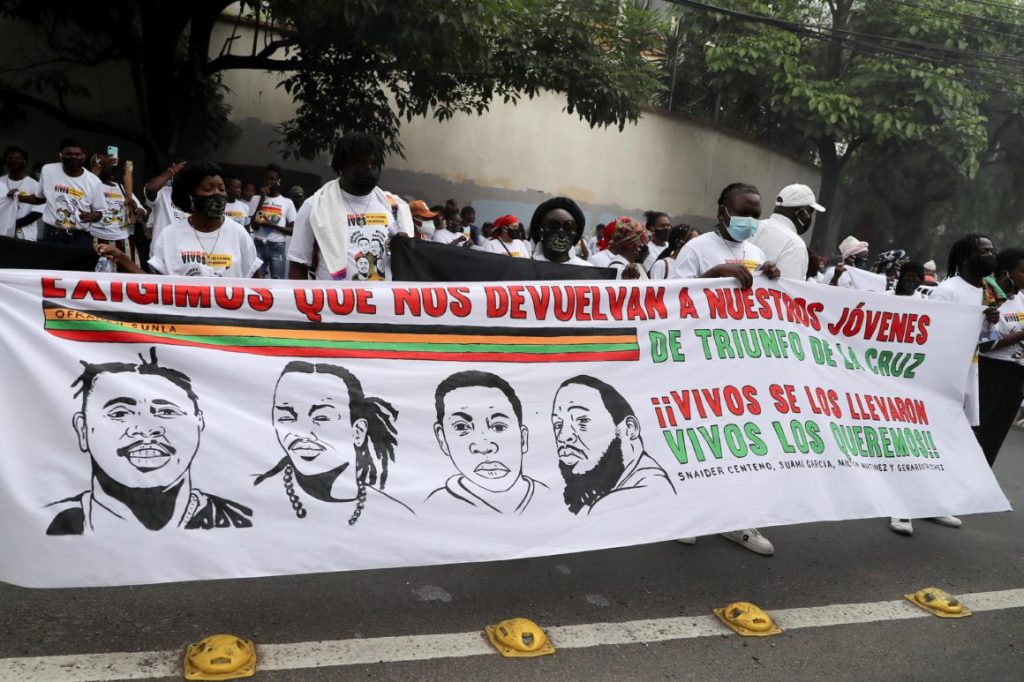On July 18, 2020, a group of heavily armed men wearing uniforms of the Police Investigation Directorate (DPI) entered the Garífuna community of Triunfo de la Cruz, in northern Honduras. The Garifunas are an oppressed national minority of mixed African and indigenous people who originally lived on Saint Vincent, a Caribbean island, and speak their own language; they were exiled to Honduras in the 18th century. The men abducted four young land defenders: Alberth Sneider Centeno, Milton Joel Martínez Álvarez, Suami Aparicio Mejía García and Gerardo Mizael Róchez Cálix. They also took Junior Rafael Juárez Mejía, a young man who was close to the community. Their families and communities still await answers from the state regarding their whereabouts.
Sneider Centeno, the president of the patronato (community council) at the time, was leading a struggle for the recovery of the community’s ancestral lands, which have been under threat by corporations in the tourism and African oil palm industries that operate with the complicity of the Honduran state. Threats against the Garífuna people have increased since 2015, when the Inter-American Court of Human Rights (IACHR) issued a ruling in favor of the communities of Triunfo de la Cruz and Punta Piedra. The decision demands that the Honduran state pay reparations to the Garífunas and return their communal lands.
On April 20 of this year, under the new Honduran government led by Xiomara Castro, the national congress repealed the law allowing the establishment of Special Economic Development Zones (ZEDEs) — areas of the country, subject to special jurisdiction, where private companies have been granted the right to establish their own legal systems, police forces, and tax authorities. The measure directly affects the Garífuna communities, as most ZEDEs are located in their territory. However, the repeal will not take effect until it is ratified by the next legislature, and the companies involved will continue to defend the operation of the ZEDEs through the courts — so the Garífuna’s struggle to oust them once and for all continues.
Two years after the abduction of the young leaders of Triunfo de la Cruz, we interviewed César Benedith, a member of OFRANEH (Honduran Black Fraternal Organization), a community leader, and former president of the patronato of Triunfo de la Cruz. He spoke of the changes that have occurred in the last year and how the community is continuing its struggle.
When we last spoke early last year, you told us that the Garífuna communities in Honduras, and especially the community leaders who are fighting for the recovery of their lands, were facing increasing persecution and violence. Has the situation changed in any way since then?
The number of murdered community leaders has decreased a little, but what has not diminished are the threats and prosecution of some of the leaders of the different Garífuna communities. The lack of justice for our people also continues, and not much has changed after these events. The Garífuna community remains vigilant and continues to fight, despite the change in government. The Garífuna and other indigenous communities in Honduras continue to suffer from the after-effects of the narco-dictatorship.
Do you feel that anything has changed for the Garífuna communities under the new administration of Xiomara Castro, who took office in January of this year?
We expect this government to comply with the ruling of the Inter-American Court of Human Rights and apply pressure to determine the whereabouts of the leaders who were abducted from their homes. On Monday, July 18, they will have been missing for two years. Xiomara has been in power for six months, and this process has only just begun, because the judiciary remains in the hands of the narco-dictatorship. So, we’re hoping for the replacement of Attorney General Óscar Fernando Chinchilla and the authorities and judges who run the Public Prosecutor’s Office and Supreme Court. They are operating under the orders of the narco-dictatorship to protect the corrupt, which include the country’s millionaires — who are the ones interested in our lands.
We’ve been informed that the president has begun to set up a new commission to comply with the ruling. As a community, we’re waiting for the commission to be formed and for the government to call us to establish a dialogue and start working toward the demarcation, delimitation, and recovery of the lands that belong to the communities of Triunfo de la Cruz and Punta Piedra.
A meeting with indigenous peoples is scheduled for August 1 and 2 at the presidential residence, in which we plan to participate, and we’re going to ask about progress of the commission and when it will begin to operate.
In February 2021, the community of Triunfo de la Cruz established a committee called “SUNLA” to investigate the case and search for the abducted leaders. OFRANEH is demanding that Xiomara’s government include this committee in its investigations of enforced disappearances. Can you tell us about the committee’s work over the last year and whether you expect the current government to include it in its search process?
As a community, we believe that SUNLA’s work is very necessary. It works with international legal experts to investigate the cases further. There are also members of our organization doing that work. SUNLA is what we have and what we trust. The state’s negligence has forced us to conduct our own investigations — ones we can trust. That’s why SUNLA was created. We hope Xiomara Castro’s government will incorporate SUNLA in its work on the issue of the disappeared activists, not only in the Garífuna communities, but in the nine indigenous communities of Honduras.
The appointment of a prosecutor for these types of issues is very important. It will be very helpful for indigenous peoples. There is a public prosecutor’s office for matters regarding the indigenous peoples, the public prosecutor’s office for ethnic groups, but nothing has been done with it. They argue that they have not been given the financial support they need to be able to operate, so they can’t make decisions. When these cases [of violence against indigenous communities] arise, they ask them to do this work, but they can’t work without resources. So, we don’t believe the state intends to strengthen that prosecutor’s office. That’s why we, as an organization, are asking for a public prosecutor’s office that can handle these issues directly with the indigenous peoples, without any undue influence.
In April, the government repealed the law on the ZEDEs, the Special Economic Development Zones, some of which are located in Garífuna territory. How does the measure affect the Garífuna community and what more needs to be done to put an end to these zones?
For us, the repeal of the law on ZEDEs was something to celebrate. The Garífuna communities and the indigenous peoples of Honduras were in the eye of the storm when it came to the ZEDEs, because they were trying to sell off pieces of the country. The president promised that it would be repealed and she fulfilled that promise, but I know that governments can change. So we, as a people who have always struggled for our rights, have to keep moving forward. The government has taken an important step by repealing the law on the ZEDEs, but we know that the people have to continue to apply pressure so we can have governments that completely repeal it and the members of congress don’t sell out in the future — because it’s ultimately the people’s decision.
How does the struggle continue?
The struggle keeps getting stronger. Here in my community, we’re working on the recovery of different areas of land that belong to our community. We’re working with the [community] commission for compliance with the [IACHR] ruling. It hasn’t been easy, especially with the youth. After the leaders were abducted from our community, many young people are afraid of doing this work. They’re afraid because we still don’t have a security system to protect us. In the community, we feel that if the enemy comes now, the same thing can happen to any of us. We don’t have the protection we need right now.
But we discussed the issue of security in a meeting we held today. We decided that we have to present a proposal to the state for its compliance with the ruling. Among the improvements to be discussed, we want to include the issue of security, so that we can have cameras in our community, for example. As a community leader, I have no security, but our struggle continues. We receive threats constantly, but neither I nor my family have the protection that the state should provide us with.
Can you tell us about the threats you’ve received?
Well, we’re leaders who are recovering our territory, so we’ve received many threats— especially when I became president of the patronato after they abducted Sneider. I received many threats by phone, direct messages saying, “Watch what you do” and “You’ll be next if you keep messing around with the land recoveries, if you keep demanding compliance with the ruling.” So I no longer have the freedom I used to have. After the abduction, I wasn’t able to go back to work in the mountains, because I don’t have the security I need to go to work there alone. I had to stop going.
Did you used to work the land?
Yes, I used to grow yuca and plantains. That’s how I supported my family. I’m also a musician. But I had to stop doing that work because I don’t have the necessary security.
Have you had to look for new sources of income?
I make a living as a musician now. I make music, especially on the weekends. I get by when I have a good season, and when I don’t I get help from my brothers, my family, who give me a hand from time to time.
Can you tell us about the land recovery initiatives that are being carried out in the Garífuna communities?
We are taking these initiatives to recover our food sovereignty. Our problem in Triunfo de la Cruz is that the millionaires have taken over the areas where we plant our crops, where our ancestors planted their crops. Right now they’re filling them with African oil palms. That’s why we’re asking the government to speed up the process to prevent them from planting more of these on our territory and continuing to ruin our lands where we grow our own crops.
We’re working as a community to recover our land so we can have a space in the center of our community for our children’s education. We’re also building a technical school and an agricultural school. Young people are being given land so that they can build their homes in the community at no cost.
What message would you like to send out to our readers regarding the situation of the Garífuna community?
The last thing I would like to say is that our struggle continues. We know that the struggle for land is not easy, and we ask that the international community remain vigilant and continue to show solidarity.
I would like to send my regards to the people of Brazil. We recently welcomed a delegation of people from different universities in Brazil who came here to ask questions and learn about these issues. It is often through international support and solidarity that we are able to make progress and be heard, through you, through the media. Without your support, we know that we would not be easily heard. And we ask that people continue to show solidarity and respect for our Garífuna communities. We thank you for your unconditional support and we hope that the struggle of our peoples in Latin America continues to grow every day, so we can defend ourselves.
First published in Spanish on July 18 in La Izquierda Diario.
Translation by Marisela Trevin











